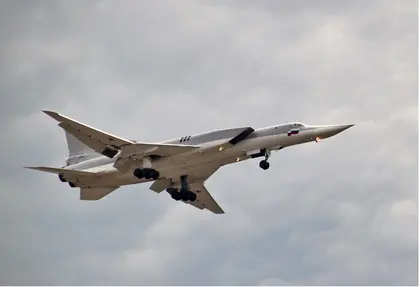Ivana Stradner, one of the world’s leading experts on Russian disinformation, serves as an advisor to the Barish Center for Media Integrity at the Foundation for Defense of Democracies, where she focuses on Russia’s information warfare. Stradner talks to Kyiv Post about Russian disinformation and the war against pro-Russian ‘fake news’.
Today, the topic of Russian disinformation dominates the headlines in the context of Ukraine – accusations of American biolabs in Ukraine, Ukraine seeking nuclear weapons, the Zelensky Government being a Nazi plot, or that NATO is presently in Ukraine. Does this surprise you?
These accusations don’t surprise me at all. We should not forget that Russia’s Minister of Defense, Sergey Shoigu, openly stated that information warfare has become a critical weapon for their military. The Russian military employs information operations to shape the perceptions of foreign and domestic populations to affect the decision-making process of adversaries. As a result, if we want to win the information war with Russia we need to have information superiority, as it is the key element of success in new-generation wars.
Russia, like the USSR before it, uses disinformation about bio-medical issues. Do you see that today, for instance with monkeypox?
Just like during the Covid-19 pandemic, the Russian government has resorted to its usual playbook of spreading disinformation to distort global perceptions of the truth. This time around, the Russian Ministry of Defense’s goal is to tie monkeypox’s origins to the United States.

Did Peace Between Russia and Ukraine Slip Through Their Fingers in April 2022?
What do they say?
Current disinformation ranges from claims that monkeypox came from US biological labs in Nigeria and Ukraine, to arguments that a US-led monkeypox simulation held last year at the Munich Security Conference resembles the current outbreak too much to be a coincidence; the one uniting theme is that all of the evidence is tenuous.
What do the Russians tell the Russian people about the disease’s spread?
On the domestic front, the media is claiming Russia has no cases and is mocking the West’s current outbreak by discussing how it only affects the gay population. Russia will likely use its supposed immunity from the outbreak to justify the Kremlin’s 2013 homophobic gay propaganda that emphasizes “traditional spiritual and moral values”.
If that is how Russia currently spins monkeypox – how did the USSR manipulate HIV/AIDs?
Like Russia’s current monkeypox disinformation, Soviet HIV-AIDS propaganda used disinformation to falsely claim the US was manufacturing bioweapons. For example, during the Cold War, the KGB conducted ‘Operation Denver’, a disinformation campaign geared towards blaming the US government for creating and releasing the HIV virus that causes AIDS. This campaign achieved high levels of global success. In a separate disinformation campaign, the KGB created and dispersed the narrative that the US, along with its allies in South Africa and Israel, used “ethnic weapons” to kill Africans and Arabs.
How is disinformation being used in other continents, such as in Africa?
Russia has been investing in disinformation campaigns in Africa for a long time for both economic and security reasons. The Kremlin has been spreading propaganda through media platforms like RT and Sputnik, as well as through official visits, like Lavrov’s recent tour. The goal has been to convince people in Africa that Russia is a benevolent, humanitarian great power, and to juxtapose the West as an exploitative villain.
How does Russia spread disinformation about Ukraine in Africa?
With regards to the current war in Ukraine, Russia has been targeting countries in Africa and the Middle East affected the most by war-related grain shortages, with propaganda blaming the West. With this disinformation, Russia is trying to cover up their complicity in what I am concerned might become a serious food crisis in Africa, which might lead to more social unrest and could potentially cause another refugee crisis in Europe.
You’re originally from Serbia: Why is Serbia such a strong outlier in Europe with such strong support for Russia? What sort of Russian propaganda is found in Serbia?
I always say that Russian influence in Serbia is so successful because the Serbs never experienced what it’s like living under Russian occupation. Russia has been working hard to pull the Balkans into a network of states that gravitate towards the Kremlin. Moscow’s augmented influence in the Balkans serves as another theatre intended to distract the West. Similar to the Kremlin’s strategy in the Caucasus, Russia’s goal in the Balkans is to “escalate to de-escalate” and position itself as the sole mediator of conflict.
What do they hope to achieve?
This game plan accomplishes two goals: strengthening Moscow’s standing in the region, and giving Putin leverage over Western powers who don’t want violence to further escalate. To achieve this agenda, Russia has been amplifying anti-Western sentiments by both investing in Serbia’s media sector where Sputnik and (soon) RT operate, and supporting nationalist movements.
Who is winning the information/disinformation war: Russia or the West?
It depends on who you ask. Russia might have lost the information war in the Twitter bubble; it’s also unlikely that some of its more far-fetched propaganda, such as claims that we train migratory birds to spread bioweapons in Russia (yes, Russia said this), will convince the majority of people in Washington, DC. However, Moscow is doing a great job using other social media platforms such as Instagram, Facebook, Telegram, and VK, to target its allies in Africa, Asia and the Balkans. While the West has done excellent work with defensive measures to protect itself from Russian info ops, I am afraid the West is not doing enough in winning hearts and minds globally.
In that case, what should the West and Ukraine do to have better information campaigns?
Ukraine is doing phenomenal work with information operations and we should watch and learn from them. The West has conducted numerous preventive measures in the information space. However, for not very clear reasons, after the end of the Cold War, the West stopped using information operations offensively. Many people in the West think that “propaganda” is not in accordance with our moral compass. This is wrong. We do not spread disinformation- the truth is on our side. The West has to treat information as a weapon and it’s high time for us to embrace the fact that the battlefield has changed.
With the rise of social media, how has disinformation changed?
Russian active measures are not new. What’s new is the technology that allows Russian disinformation to flow more quickly. During the Cold War, it was much more difficult to co-opt a journalist in a top newspaper to write a story about how the US uses AIDS as a bioweapon. Now, with social media you can reach millions of people with your Twitter account and spread lies about Covid-19 or Monkeypox without needing to jump through any hoops.
What are Russia’s objectives with disinformation in Western European countries or the United States?
Russian information operations allow Russia to challenge the West and the US in an asymmetric manner given that Moscow cannot easily challenge the West using conventional military tactics. For more than a decade, Russia has been using the information space to make wedges within the transatlantic community, to undermine NATO and the EU and distort the concept of democracy.
You can also highlight the text and press Ctrl + Enter







Comments (0)